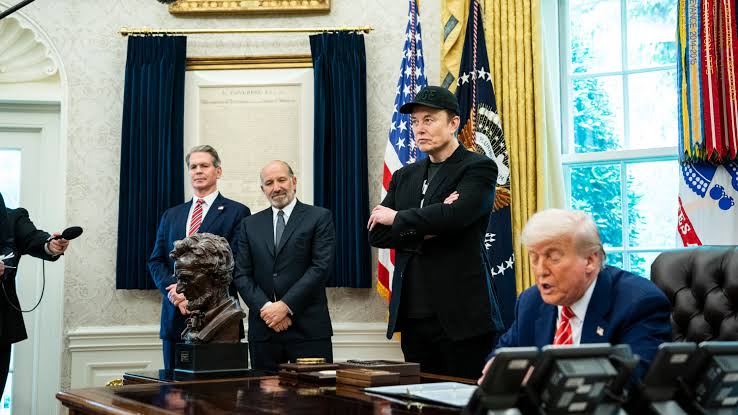Washington D.C., June 5, 2025: A political showdown has erupted between President Donald Trump and billionaire entrepreneur Elon Musk, as tensions over fiscal policy and personal loyalty spilled into the public sphere on Wednesday. The clash follows Trump’s sharp criticism of Musk for opposing his administration’s latest tax-and-spending bill, which includes the elimination of electric vehicle (EV) tax credits a move Musk denounced.
Trump, speaking at a press event in Florida, dismissed Musk’s objections by accusing him of self-interest. “Elon is upset because we’re cutting handouts to rich EV companies. It’s always about the money,” Trump said, implying Musk’s protest stems from the financial impact on Tesla, the electric vehicle company he leads.
Musk, who briefly served as head of the Department of Government Efficiency (DOGE) in the early days of the Trump administration, responded swiftly and publicly on X (formerly Twitter). In a striking declaration, he posted:
“Without me, Trump would have lost the election, Dems would control the House and the Republicans would be 51-49 in the Senate.”
Minutes later, he followed up with a stinging remark: “Such ingratitude.”
The tweets represent Musk’s most explicit assertion yet of his political influence. His message paints him not only as a key supporter of Trump’s 2024 campaign but also as a figure whose intervention allegedly shifted the balance of power in Congress. His expression of disappointment indicates a serious rift forming between two former allies.
This public exchange has rattled markets, with Tesla shares falling nearly 6% amid fears that Musk’s fallout with Trump could jeopardize federal cooperation on major infrastructure and defense projects involving SpaceX and Starlink. Industry voices also raised alarms over the repeal of the $7,500 EV tax credit, which they say has driven job growth and innovation across multiple U.S. states.
Though Musk had once advocated for removing EV credits saying they unfairly benefited his company his more recent stance favors targeted incentives and fiscal discipline. He now criticizes the bill as an example of poor spending choices, arguing that Washington should cut bureaucratic waste instead of undercutting clean energy industries.
The growing conflict underscores a deeper shift in the dynamics between political power and private influence. Once seen as a powerful ally to the Trump administration, Musk now appears poised to take on a more adversarial role, one driven by ideology, ego, and economic interest.
Trump Criticizes Elon Musk Over EV Tax Credit Dissent; Musk Fires Back, Claims He Secured 2024 Win and Slams “Ingratitude”

